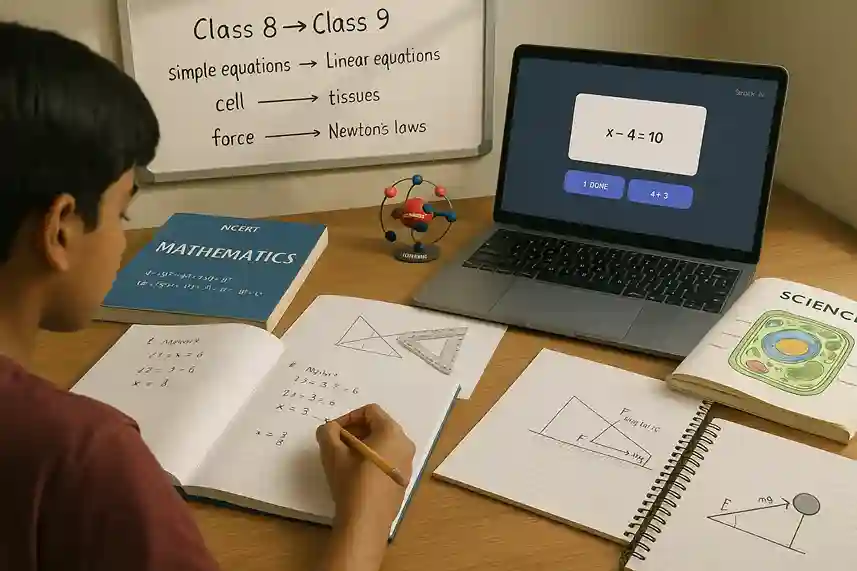Key Class 8 topics that prepare students for advanced Class 9 concepts
Class 8 plays a critical role in building foundations for Class 9 success. This blog highlights the essential bridge topics in Maths and Science, explains how they reappear in Class 9, and offers preparation strategies, resources, and guidance for parents and teachers.

For CBSE students, Class 8 is more than just another year of middle school. It is a foundation year that prepares students for the advanced demands of Class 9, where concepts become deeper, more abstract, and exam-oriented. Certain topics in Class 8 act as a direct bridge to Class 9, and mastering them early helps students avoid unnecessary struggles later. This guide highlights those bridge topics, explains their relevance, and offers practical strategies for both students and parents.
Class 9 marks the beginning of secondary school, and the syllabus takes a significant leap in difficulty. Students often find themselves overwhelmed not because the material is entirely new, but because they did not build strong foundations in Class 8. By focusing on core bridge topics in Maths and Science, students can transition smoothly into Class 9 and beyond. Teachers often emphasize that Class 8 is the year where habits of clarity, problem-solving, and conceptual thinking should be firmly established.
In Class 8, students are introduced to algebraic identities, simple equations, and polynomial basics. These concepts form the building blocks of advanced algebra in Class 9, where students learn factorization, quadratic equations, and linear equations in two variables. A weak base in Class 8 algebra can make higher-level problem-solving very challenging later.
Class 8 geometry covers the properties of quadrilaterals, triangles, and circles. These basics expand into more formal proofs, constructions, and coordinate geometry in Class 9. Students who understand reasoning in geometry early on find it easier to adapt to the logical proofs required in higher classes.
Class 8 introduces students to cell structure and functions. In Class 9, this expands into detailed studies of cell division, tissues, and complex biological processes. Without a solid grasp of cell basics, students may find Class 9 biology overwhelming.
The atomic structure introduced in Class 8—atoms, molecules, and chemical formulas—forms the basis for Class 9 chemistry, where students learn about atomic models, isotopes, and laws of chemical combination. Understanding these fundamentals early prevents confusion later.
Class 8 physics covers force, pressure, and friction, all of which reappear in Class 9 in the form of Newton’s laws of motion, gravitation, and work-energy concepts. Students who grasp these early find the Class 9 applications much easier to understand.
Bridge topics are not just repeated but expanded with greater depth. For example, solving equations in Class 8 evolves into simultaneous equations in Class 9. The simple idea of an atom becomes the study of atomic models, isotopes, and molecular structures. Similarly, the concept of force moves from simple push-and-pull examples to advanced laws of motion. Recognizing these connections helps students see continuity rather than treating each year as unrelated.
Practice NCERT exercises regularly to strengthen conceptual clarity.
Focus on understanding “why” behind formulas, not just “how” to apply them.
Use diagrams, models, and visualizations for topics like cells and geometry.
Revise bridge topics during holidays before moving to Class 9.
Leverage digital platforms like Edzy for gamified quizzes and flashcards to keep practice engaging.
Many students underestimate Class 8, treating it as a less important year compared to Class 9 and 10. This results in weak foundations. Other common mistakes include focusing only on direct answers without conceptual understanding, neglecting diagrams and practical applications, and skipping NCERT examples which often reappear in exams. Parents and teachers should remind students that Class 8 preparation reduces the stress of Class 9 transition.
To strengthen bridge topics, students can use:
NCERT textbooks and exemplars for problem-solving practice
Reference books with step-by-step explanations
Online tutoring platforms offering targeted bridge topic modules
Edzy’s AI-powered revision tools that break topics into manageable practice sessions
Parents and teachers are crucial in ensuring students do not miss out on these bridge topics. Teachers should highlight which concepts carry forward and encourage regular practice. Parents can support by creating a balanced study routine at home, checking progress on key topics, and motivating children to practice consistently. Encouraging curiosity and application of knowledge in daily life—like linking force concepts to sports or using algebra in budgeting—can make learning natural and enjoyable.
By giving Class 8 the attention it deserves, students can enter Class 9 with confidence, prepared not only for the immediate challenges but also for the long-term academic journey ahead.

How to Master CBSE Class 10 Maths Word Problems Step by Step
Unlock the secrets to solving Maths word problems with confidence.

How to Improve English Writing Skills for CBSE Exams
Mastering English writing for better CBSE exam scores

How to Build Concept Clarity in NCERT Science
Mastering Science through Concept Clarity for NCERT Students

Unlocking the Power of Grammar: Common English Mistakes CBSE Students Should Avoid
Master grammar to enhance your writing and avoid common pitfalls.